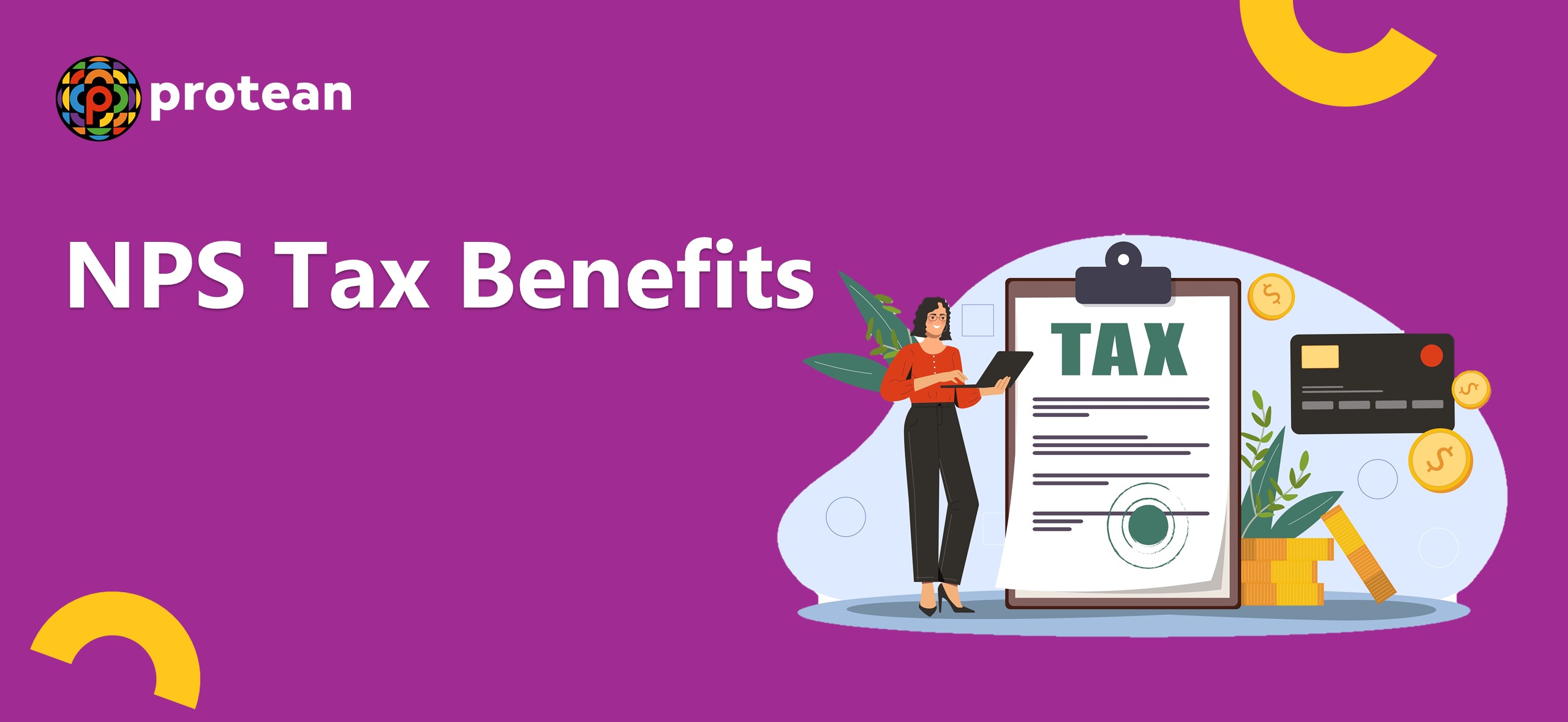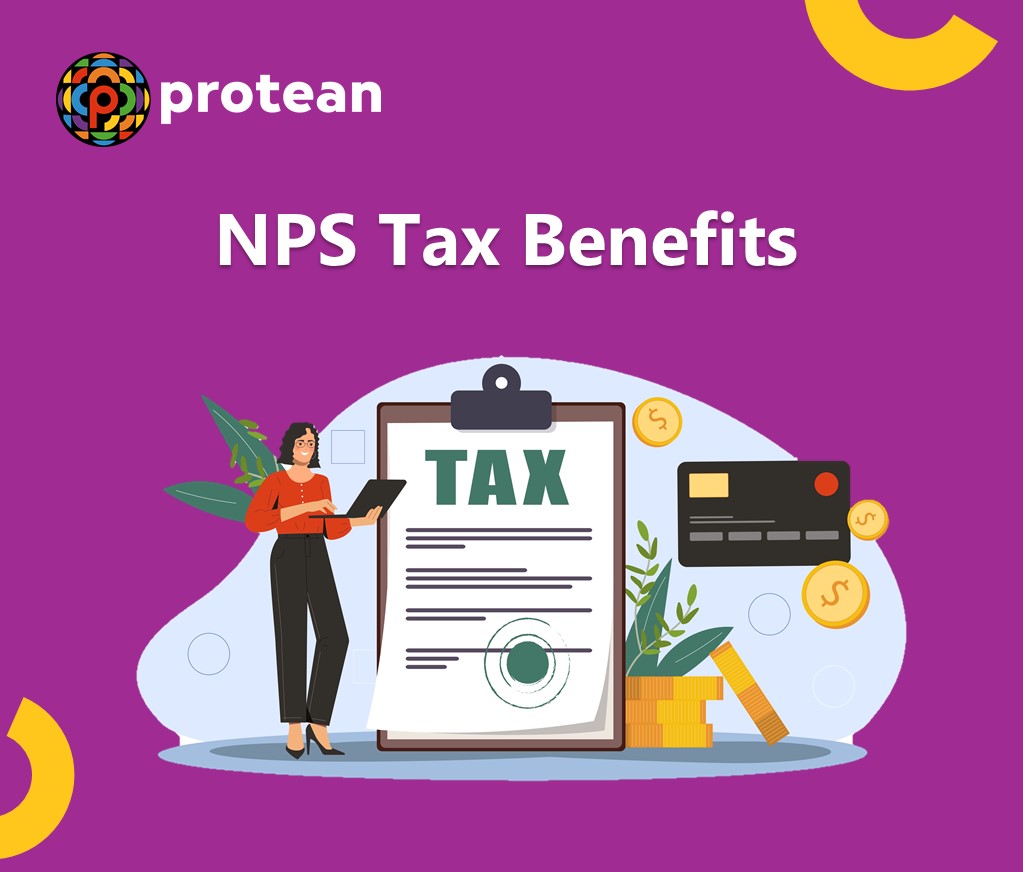The National Pension System (NPS) is a robust retirement savings option in India, providing substantial tax benefits to its subscribers. By contributing to an NPS account, individuals can claim tax deductions and reduce their taxable income, making it an appealing choice for long-term financial planning. Read the blog to know more.
What are the tax benefits of NPS?
When a subscriber self contributes to their NPS account they can claim tax deductions on up to Rs.2 Lakhs of their annual income. However, the NPS tax benefits are only restricted to the Tier-1 account type.
While categorising the subscribers the PFRDA segregates all beneficiaries under 3 models:
- General citizens (Retail segment)
- Government employees
- Corporate employees
For the retail NPS account holders, an overall tax deduction of up to Rs.1.5 Lakhs a year is permissible under Section 80CCE of the Income Tax Act, 1961.
For corporate NPS model beneficiaries, the tax exemption limit under Section 80CCD(2) has been set up to 10% of the individual’s salary (basic + DA). However, it should not exceed Rs.1.5 Lakhs in a fiscal cycle.
For Central Government employees, the tax benefits are extended on their income of up to 14% of the salary (basic + DA). However, the upper limit of tax-deductible income is still the same, i.e., Rs.1.5 Lakhs in a year. For State Government employees, the tax benefit provisions are similar to those set for corporate employees.
Is it possible to leverage an additional 50k tax deduction under the Tier II NPS account?
If you are maintaining a Tier-1 NPS account, holding a Tier-2 account is optional and the contributions you make towards it can be withdrawn at any moment. Also, there are no tax benefits attached to the Tier-2 NPS account type.
Nonetheless, yearly contributions to a Tier-1 account attract decent tax benefits of NPS for corporate employees, government employees as well as retail subscribers. Under Section 80CCD(1), you can enjoy tax rebates on contributions of up to Rs.1.5 Lakhs in a year. To get the additional Rs. 50,000 income tax deduction, you have to file an ITR under Section 80CCD(2).
Moreover, when your employer contributes, a net 10% of your salary becomes eligible for tax deduction under Section 80CCD(2).
All these advantages are making the National Pension Scheme popular among the masses as it helps reduce the confusion of maintaining multiple investment accounts. Also, it is a very low-cost product that is backed by the PFRDA. NPS accounts offer each beneficiary much flexibility in controlling where they want their contributions to be invested.
To know about this, listen to the podcast available on SoundCloud:
How corporate employees can get dual NPS tax benefits on both their own and their employer’s contributions?
Corporate NPS schemes enable employee to save their tax-deductible income as per Section 80C of the Income Tax Act. Therefore, if you are working in the corporate sector, you can route the NPS contributions through your employer directly to claim that portion eligible for tax exemption.
From the salary that you receive each month (basic salary + Dearness Allowance), you can invest in a Tier-1 NPS account to claim a deduction under Section 80CCD (2). Although there aren't any restrictions regarding the yearly contributions, still the NPS tax benefit for salaried employees is capped at Rs.1.5 Lakhs or 10% of their salary, whichever is lower.
Additionally, you can decide to make your own contributions to the Tier-1 account of up to Rs.50,000. This amount is also eligible for tax deduction as per Section 80CCD (1B). You can claim both of these tax-saving provisions simultaneously.
However, please note that while you will be exiting from the scheme up to 60% of the corpus will be tax-exempt. The rest 40% or more, i.e., the amount that you wish to buy an annuity plan with, will be treated as a separate investment. Thus, this portion of the contribution is taxed appropriately.
If you wish to learn in detail about the NPS tax-saving policies in Hindi, you may check out this podcast: https://soundcloud.com/nps-ki-pathshala-podcast/107-why-should-corporate-join-nps-instead-of-epf?utm_source=clipboard&utm_medium=text&utm_campaign=social_sharing
You will find this track on the "NPS Ki Pathshala" page which is now live on Soundcloud. Also, for an audio-visual explanation, you can search for the YouTube channel with the same name.
What are the additional tax advantages for NPS subscribers other than Section 80C and Section 80CCD (1B)?
Under certain situations, the NPS investors can enjoy several other tax-saving benefits that aren’t listed in the IT Act. For instance, after maintaining your NPS account for 3 years if you redeem the corpus partially, then you are entitled to receive the full requested amount.
However, the amount claimed must be less than or equal to 25% of the accumulated corpus at that time. Also, the cause for withdrawal needs to be legitimate, such as for higher education, child marriage, medical expenses, and so on.
Moreover, the market-linked returns that your account continually receives won’t attract any tax deductions until the Tier-1 account reaches maturity. Finally, for lump sum withdrawal of the corpus on maturity, i.e., 60% of the amount, there is no tax deduction as per Section 10(12A).
How much is the NPS interest rate?
The NPS returns are not fixed as the contributors' funds are invested by Pension Fund Managers in the secondary market. Historically, the National Pension Scheme has produced interest returns within the range of 9-12% per annum.
Therefore, if you compare its performance with PPF over the past 5 years, the NPS stands out as the clear winner. This is because from 2018 the PPF returns have hovered within the range of 7-8%.
Please note: NPS is a government-backed pension product with a wide range of tax benefits. However, as it is market-linked, the returns cannot be estimated accurately and will always rely on the proportion of asset allocation in your portfolio.
Can you get additional benefits if your company adopts NPS?
When a company adopts NPS and makes additional contributions to the NPS scheme of their employees, they can get extra benefits. Aside from receiving a higher pension amount, you can receive extra tax benefits under Section 80CCD(2) of the Income Tax Act.
Once a company adopts NPS, they will have to contribute 10% of the employee's salary to their NPS scheme per year. This way, the taxable income of the employee is reduced leading to tax savings of the employee as well as the final pension amount is increased.
Learn more about this via the podcast link given:https://soundcloud.com/nps-ki-pathshala-podcast/9-additional-benefits-you-get-if-your-company-adopts-nps
| Simplify your NPS contributions and optimize your investment strategy – learn more with our detailed guide. |
- Story by Kakoli Laha

